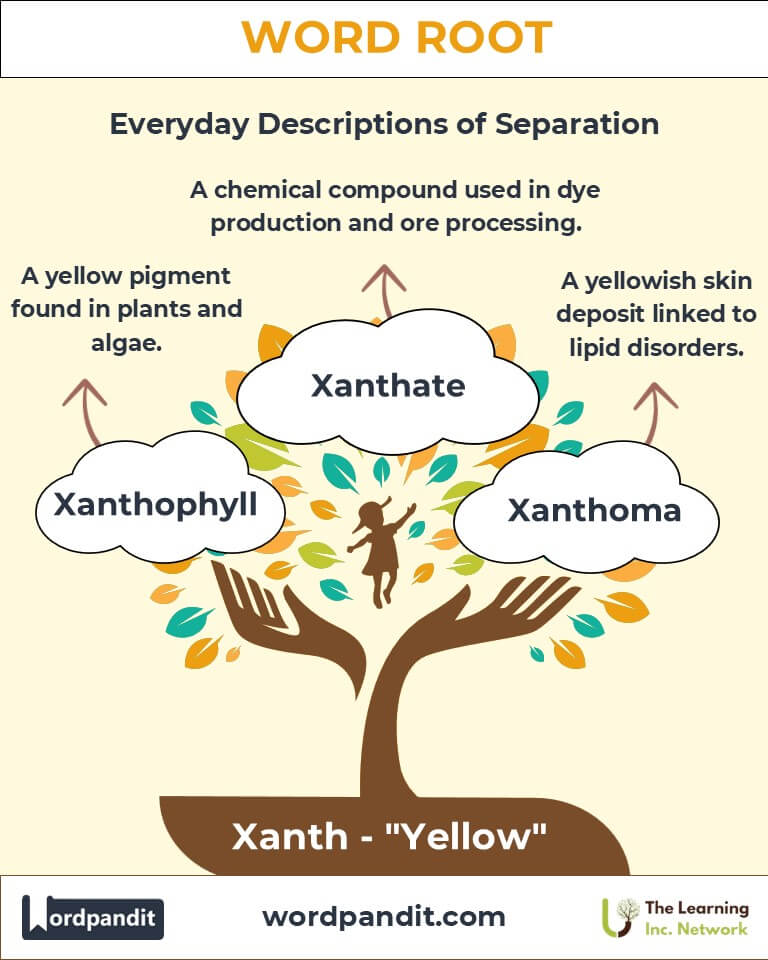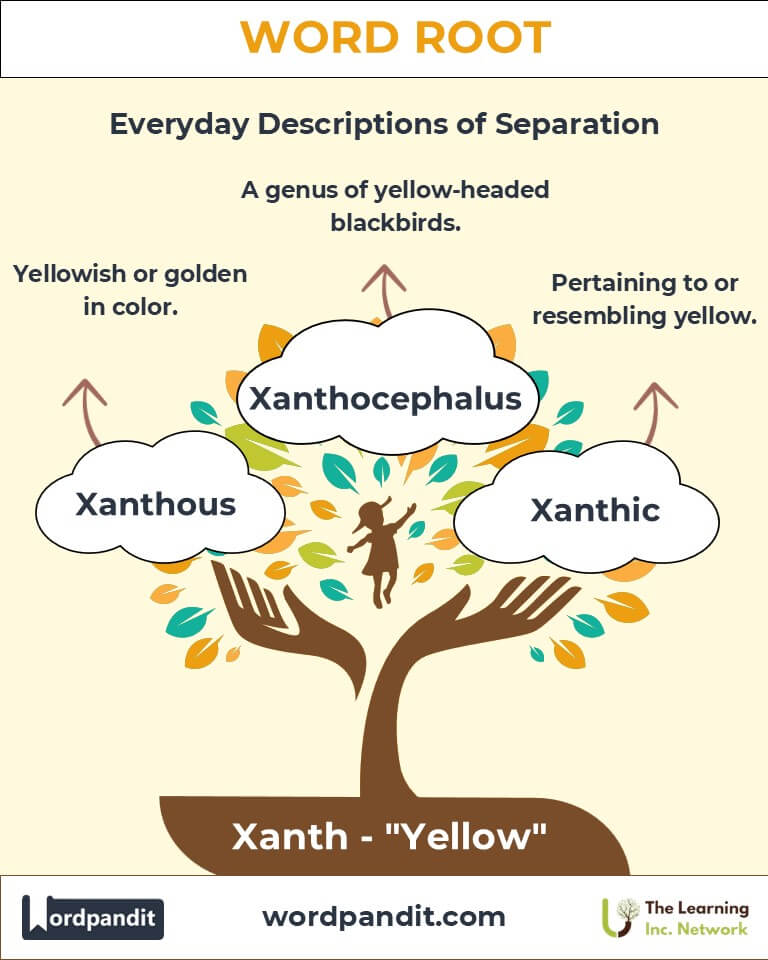Xanth: The Golden Thread of Yellow in Language and Science
Dive into the fascinating world of the word root "xanth," meaning "yellow." From its vibrant presence in natural pigments to its role in scientific terminologies, "xanth" paints a colorful story across disciplines and cultures.

Table of Contents
- Introduction: The Essence of Xanth
- Etymology and Historical Journey
- Mnemonic: Unlocking the Power of Xanth
- Common Xanth-Related Terms
- Xanth Through Time
- Xanth in Specialized Fields
- Illustrative Story: Xanth in Action
- Cultural Significance of the Xanth Root
- The Xanth Family Tree
- FAQs About the Xanth Word Root
- Test Your Knowledge: Xanth Word Root Quiz
- Conclusion: The Golden Legacy of Xanth
1. Introduction: The Essence of Xanth
Pronounced zanth, this root derives from the Greek word xanthos, meaning "yellow." Its golden hue finds resonance in nature, science, and art. From xanthophyll, a pigment in leaves, to xanthous, a descriptor for yellowish tones, this root captures the vibrancy and richness of the color yellow. Whether in biology or culture, "xanth" symbolizes light, vitality, and energy.

2. Etymology and Historical Journey
The root "xanth" traces its origins to ancient Greek, where xanthos was commonly used to describe yellow hues, especially in hair and textiles. Over time, its applications broadened to scientific terms in botany, biochemistry, and medicine. The Renaissance’s fascination with classical languages ensured "xanth" found its place in modern European lexicons, particularly in scientific nomenclature.
3. Mnemonic: Unlocking the Power of Xanth
Imagine a golden sunflower basking under the sun, its petals glowing with yellow vibrancy. Think:
"Xanth is the glow of yellow, lighting nature’s palette."
4. Common Xanth-Related Terms
- Xanthophyll (zan-thuh-fil)
- Definition: A yellow pigment found in plants and algae.
- Example: "The vivid autumn leaves owe their color to xanthophyll pigments."
- Xanthous (zan-thus)
- Definition: Yellowish or golden in color.
- Example: "Her xanthous complexion glowed in the sunlight."
- Xanthoma (zan-thoh-muh)
- Definition: A yellowish skin deposit often linked to lipid disorders.
- Example: "The dermatologist diagnosed the patch as a xanthoma."
- Xanthocephalus (zan-thoh-sef-uh-lus)
- Definition: A genus of yellow-headed blackbirds.
- Example: "Xanthocephalus birds are a stunning sight in wetlands."
- Xanthic (zan-thik)
- Definition: Pertaining to or resembling yellow.
- Example: "The xanthic dye added a vibrant touch to the fabric."
5. Xanth Through Time
- Xanthippe (Classical): Socrates’ wife, whose name means "yellow horse," reflecting ancient naming practices tied to appearances or traits.
- Xanthophyll (Scientific): The term evolved in modern botany to describe carotenoid pigments essential for photosynthesis and plant coloration.
- Xanthoma (Medical): Emerging in 19th-century medicine, xanthomas became a clinical sign for underlying metabolic conditions.
6. Xanth in Specialized Fields
- Botany:
- Xanthophyll: Explains yellow pigments in plants, crucial for photosynthesis and protection against light damage.
- Medicine:
- Xanthoma: Highlights lipid storage issues, guiding diagnosis in dermatology and endocrinology.
- Ornithology:
- Xanthocephalus: Demonstrates the root’s descriptive utility in classifying yellow-colored species.
- Chemistry:
- Xanthate: A salt used in dye production and ore processing, showcasing the root’s reach in industrial science.
7. Illustrative Story: Xanth in Action
A group of botanists explored the fall foliage in Vermont. Amid the vibrant reds and oranges, Dr. Elena pointed out the golden hues in the leaves, explaining, "This is the work of xanthophyll, a pigment that protects plants by absorbing excess light." The group marveled at how "xanth" painted the season’s most stunning landscapes.
8. Cultural Significance of the Xanth Root
Yellow, symbolized by "xanth," holds varied cultural meanings. In ancient Greece, it represented vitality and warmth. Asian cultures often link yellow to prosperity and royalty. Even today, shades of yellow are celebrated for their optimism and energy, as seen in art, fashion, and global festivals.

9. The Xanth Family Tree
- Flav- (Latin: yellow)
- Example: Flavonoid – plant compounds with health benefits.
- Chryso- (Greek: golden)
- Example: Chrysanthemum – golden flower.
- Luteo- (Latin: yellowish)
- Example: Lutein – a carotenoid found in the eye and leafy greens.

10. FAQs About " Xanth "
Q: What does the root "xanth" mean?
A: The root "xanth" comes from the Greek word "xanthos," meaning "yellow." It is used in scientific and descriptive contexts to refer to yellowish colors or characteristics, such as "xanthophyll" (a yellow pigment in plants).
Q: How is "xanthophyll" connected to "xanth"?
A: "Xanthophyll" is derived from "xanth" (yellow) and "phyll" (leaf). It refers to a yellow pigment found in plant leaves, which plays a role in photosynthesis and gives some leaves their yellow hue.
Q: What does "xanthoderma" describe?
A: "Xanthoderma" combines "xanth" (yellow) and "derma" (skin), referring to yellow discoloration of the skin. It is often associated with medical conditions or dietary factors.
Q: Why is "xanthochromia" significant in medicine?
A: "Xanthochromia" describes a yellowish discoloration of bodily fluids, such as cerebrospinal fluid, often used as a diagnostic marker for certain medical conditions like hemorrhages.
Q: What is the origin of "xanthoma"?
A: "Xanthoma" comes from "xanth" (yellow) and refers to yellowish fatty deposits that form in the skin or tendons, often associated with lipid disorders.
11. Test Your Knowledge: " Xanth " Mastery Quiz
1. What does "xanth" mean?
2. Which term refers to yellow pigment in plants?
3. What does "xanthoderma" describe?
4. What does "xanthochromia" indicate in medicine?
5. What are "xanthomas"?
12. Conclusion: The Golden Legacy of Xanth
From the brilliance of autumn leaves to the intricate science of pigments, "xanth" celebrates yellow’s radiance. Its contributions to language and knowledge highlight the enduring beauty of nature’s palette. Explore "xanth," and discover how this root adds a golden glow to our understanding of the world.












